#future of data science
Explore tagged Tumblr posts
Text
How a Data Science Course in Kochi Can Help You Land a High-Paying Job
The job market is being entirely reshaped by digital technologies, automation, and data explosion. One of the most fascinating and lucrative professional courses in the economy right now is data science, an interdisciplinary discipline that combines math, statistics, coding, and domain knowledge to transform data into actionables. As organizations in all sectors adopt data-driven decision-making, demand for skilled data scientists continues to grow. For anyone who wishes to experience this wave, a course in data science in Kochi may be the beginning of a lucrative and future-proofed career.
Kochi, also referred to as the commercial hub of Kerala, is becoming increasingly prominent as a technological and innovation center. With the establishment of major IT parks like Infopark and the growing number of national and international firms, the city has been witnessing a massive demand for data science professionals. By enrolling in a specialized data science course in Kochi, you not only have the opportunity to access quality education but also end up amidst an emerging job market with plenty of opportunity for professional growth and economic returns.
Specialization of skills is one of the most important determinants of salary potential in any sector. Data science is a special and demanding field where skilled professionals are hard to find. Companies are looking for people to interpret data, develop prediction models, visualize patterns, and facilitate data-driven business decisions. Obtaining a professional certification in data science in Kochi provides you with these same skills—ranging from Python and R programming to the use of tools like TensorFlow, Scikit-learn, Power BI, and Tableau, naming the art of machine learning, deep learning, and data engineering. Such marketable skills make you a goldmine for any organization and increase your earning potential significantly.
Practical exposure is another determining factor to get a high-paying job. The best data science courses in Kochi do not impart just theory; they emphasize practical, project-based learning. Students engage with real-time datasets, work on real world industry problems and create portfolios that demonstrate their skills. Such exposure becomes a key differentiator while sitting through job interviews and helps you stand out among the large pool of job aspirants. Some institutions also offer internships in collaboration with local businesses, enabling you to be able to apply the learning that you have acquired in the actual business environment.
Kochi’s data science education ecosystem is also supported by a growing network of industry connections. Many institutes collaborate with IT companies, analytics companies, healthcare providers and financial institutions to ensure their course fit with market needs. These collaborations often transform into placement assistance, job referrals and recruitment drives. With such strong industry links, students can directly transform from training to employment, often with attractive salary packages and clear career progression paths.
Apart from programming abilities, the market prefers soft skills and business acumen. A properly framed data science course in Kochi is not so much coding and modeling but learning to visualize data to convey insights and to drive strategic decisions. These abilities are useful for higher-level roles such as data analysts, business intelligence practitioners, machine learning engineers, and data scientists. The better you can bridge technical facts and business worth, the more useful you are to a company—and the higher your earning capacity.
Another big plus of studying data science in Kochi is cost effectiveness in quality education. Compared to other metro cities like Bangalore, Hyderabad, or Mumbai, Kochi is a cost-effective arrangement for learners. Students are given access to excellence instructors, advanced equipment, and advanced training courses at a fraction of the price that they would pay elsewhere in other technology centers. This enables you to gain a world-class education and navigate your entry into the job market with zero financial investments, increasing your return on investment and your overall earning potential.
The number of courses available is also worth noting. The majority of training institutes in Kochi offer flexible timings, online classes, weekend batches, and mixed learning. This is especially useful for working professionals who want to reskill or shift their line of profession without quitting their current job. With the freedom to learn on your terms and at your pace, you can acquire a high-paying skill without influencing your life or income. Some courses even offer one-to-one career guidance and mentoring to help you chart a customized path to your perfect job.
Moreover, data science is a global skill. Once trained, you don't have to restrict yourself to the job in Kochi or even India. The skills learned from a well-structured course are in demand globally—in the United States of America, Europe, the Middle East, and so on. Freelance data projects and telecommuting opportunities are also available, giving professionals a chance to work with clients globally and earn foreign exchange. A study pursued in Kochi could quite easily result in a professional career for a professional all over the world and much better compensation.
It's also a good idea to consider scalability in the long run. Data science is not just a career; it's one with numerous branches and specializations. From the first position of a data analyst, you may move on to data engineer, machine learning engineer, AI researcher, or chief data officer. Each move is typically accompanied by higher compensation and additional responsibilities. A good course positions you for this long-term career development by introducing you to your strengths and interests and guiding you towards a correct specialization in the data field.
In short, the path to a high-paying job in today's digital economy begins with the right skills in the right place. Kochi, with its thriving tech infrastructure, low cost of learning, and growing employability, offers the most favorable setting for an individual to enter data science. A properly designed course here can provide you with the skills, experience, and connections required to secure a well-paying job in a fast-developing, future-focused field. If you are ready to invest in a meaningful career, a data science course in Kochi is the opportunity you have been searching for.
0 notes
Text

AI Revolution 2025: The Future of Data Science is Here! From automated decision-making to ethical AI, the data science landscape is transforming rapidly. Discover the Top 5 AI-driven shifts that will redefine industries and shape the future! Read now https://bit.ly/435ibeX
0 notes
Text
The future of data science is poised for significant evolution, driven by advancements in artificial intelligence, automation, and big data technologies. With a growing emphasis on ethical data practices and real-time analytics, data scientists will increasingly focus on predictive modelling, machine learning, and contributing to data-driven decision-making across industries. Check here to learn more.
0 notes
Text
Unlock Your Future: How a Data Science Career Transforms Lives
0 notes
Text

This read caters to deciphering the future of data science. Make it a priority to understand these core nuances before diving in as a seasoned data scientist! Explore the to know more.bit.ly/3ZieX4i
0 notes
Text
0 notes
Text
Unlocking the Power of Data: The Significance of Data Science
In the digital age, data has become an invaluable asset, and the field of data science has emerged as a key player in extracting meaningful insights from this vast ocean of information. From influencing business strategies to advancing scientific research, data science has far-reaching implications.
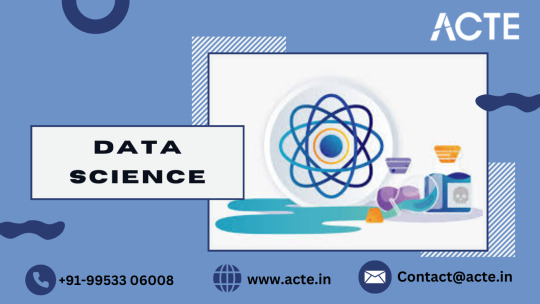
Informed Decision-Making: One of the primary reasons data science holds immense importance is its role in informed decision-making. By analyzing large datasets, organizations can glean valuable insights that guide strategic choices. Whether in business, healthcare, or government, data-driven decisions lead to more effective outcomes and a competitive edge.
2. Predictive Analytics for Future Trends: Data science enables organizations to look beyond the present and predict future trends. Through predictive analytics and machine learning algorithms, businesses can forecast market trends, optimize resources, and make proactive decisions. This foresight is particularly valuable in industries like finance, where predicting market fluctuations is crucial.
3. Efficiency and Process Optimization: Data science contributes significantly to optimizing processes and improving operational efficiency. By analyzing data, organizations can identify inefficiencies, streamline workflows, and enhance overall productivity. This efficiency translates into cost savings and a streamlined, competitive operation.
4. Personalized Experiences for Customers: In the age of personalization, data science plays a pivotal role in tailoring experiences for customers. Analyzing user behavior, preferences, and interactions allows businesses to offer personalized products, services, and recommendations. This not only enhances customer satisfaction but also fosters brand loyalty.
5. Advancements in Scientific Research: Data science is a driving force behind scientific advancements. In fields like genomics, astronomy, and climate science, data analysis facilitates the interpretation of large datasets, leading to discoveries and breakthroughs. The ability to process and understand vast amounts of information is transforming the landscape of scientific research.
6. Revolutionizing Healthcare: Healthcare has witnessed a revolution through data science. From improving diagnostics to enhancing treatment plans, data-driven insights are transforming patient care. Analyzing patient data allows for the identification of disease patterns, personalized treatment options, and more efficient healthcare delivery.
7. Fraud Detection and Security: In the realm of cybersecurity, data science is indispensable for detecting and preventing fraudulent activities. Machine learning algorithms analyze patterns and anomalies in real-time, enhancing the ability to identify and mitigate security threats. For those interested in enhancing their skills, pursuing a data science online course can provide specialized knowledge in this critical domain.
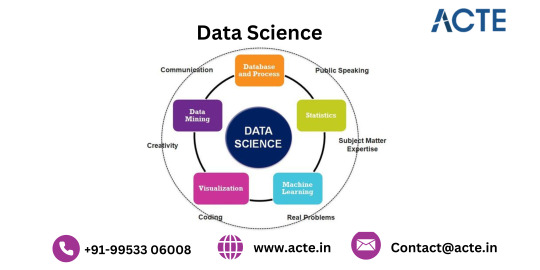
8. Marketing Strategies Optimization: Businesses leverage data science to optimize marketing strategies. Analyzing customer behavior and preferences helps organizations create targeted and effective marketing campaigns. This not only maximizes the impact of advertising efforts but also ensures a more efficient allocation of resources.
9. Supply Chain Efficiency: Data science contributes to the optimization of supply chain management. Through the analysis of data related to inventory, logistics, and demand forecasting, organizations can minimize costs, reduce waste, and ensure a smooth flow of goods and services.
10. Economic and Social Impact: Governments and policymakers utilize data science to analyze economic trends, monitor public health, and make informed policy decisions. The insights derived from data analysis contribute to more effective governance, improved public services, and better responses to societal challenges.
In conclusion, the importance of data science cannot be overstated. It serves as a catalyst for innovation, efficiency, and progress across various sectors. From shaping business strategies to advancing scientific research, data science is at the forefront of the technological revolution, unlocking the power of data for a brighter and more informed future. Whether you're a business professional, researcher, or aspiring data scientist, understanding the significance of data science is essential in navigating the evolving landscape of the digital era.
0 notes
Text
Future Scope of Data Science
Data science is the study of data to extract meaningful insights for businesses, utilizing tools like data visualization, machine learning, and statistical analysis. Data scientists clean and process data, analyze it for patterns, build models, and validate their accuracy. Essential skills include programming, statistics, machine learning, data visualization, problem-solving, and effective communication. The field's future scope is promising, with key areas like AI, IoT, personalization, healthcare, and cybersecurity benefiting from data science's data-driven approach. This growing demand makes data science a lucrative and essential career path, providing valuable skills and opportunities. Read in detail, Click on the link: https://kajaldigital.livepositively.com/future-scope-of-data-science/
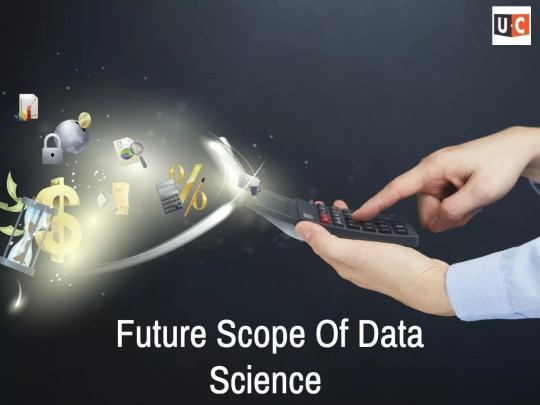
0 notes
Text
I'm watching Star Trek: TNG: datalore, and I see when they land on the planet that there's a circular staircase made out of stone. The music in the background is classically anxious. Data seems quite detached, well the others are very concerned about the death of the environment. After nearly 3 years of neglecting the show, I had forgotten how whimsical Star Trek could be.
#star trek#star trek the next generation#star trek tng#data#Captain picard#riker#tasha yar#geordi la forge#worf#honestly#even the colors of the slate stone have me impressed#I used to think the uniforms were dorky#but I have to remember that this is in the future#and somehow looking at those same uniforms doesn't bring me the same eye-rolling reaction#these are scientists and explorers#they aren't military officials#so while I used to make fun of their space pajamas#I failed to realize that they weren't here to impress anybody#they were simply here to learn#I have neglected this show for far too long#I am so glad I started watching this again#science fiction fucking rules
13 notes
·
View notes
Text
Conversation +3 and -3 about to jump in green hole
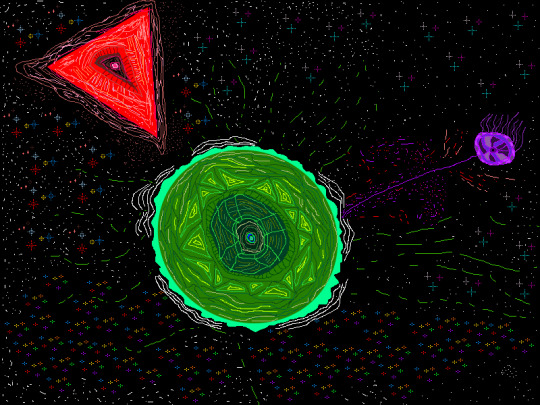
Let`s jump into this red hole and get to know what is it at the top of it?
Let`s do it, but I see before myself a purple triangle and it is turned to 45 degrees.
I am at the time distortion minus 0.5. Calibrate, please, your eye and a measure device. And, good. But, now, I see I green circle. And, what do you see?
I, also, see a green circle. Looks, now, we are at the same timeline and speak about same place. And, this is it, one block of universe. At last, we speak about the same thing!
Let`s do a jump, until everything starts to change! And do that place have a time to speed of light, and all the things, and expanse of substance things? And, what if we suddenly disappear?
Let`s do energetic lighthouses. I set mine at +3, and you set yours at +3. And we will connect it with quantum entanglement. And, in this case, we will never be lost. And drop anchor at this fragment, where we are stay now. In this case, using a rope, energetic way to make a compact pack and to slip back. Let`s calibrate it as a mainspring. And, in this case, if there is nothing there and substance cannot to exist there, then it will be effect of mainspring. And our substance particles jump out with maximum speed +1. So, this way we will do not have a time to self destruction.
And, in this case, will something happen to these spaces?
I am very sorry, but I cannot to know this. Let`s have a hope. That nothing will happens. Let`s for any case if something can to happen. To jump there with accelerated new time coordinate. I, already, has written a Basic program. Right now, I start I calculation with Sintez 2. And you to support calculation with MSX2. Press return and let`s jump!
This information was read from informational surface of a black hole from the galaxy Andromeda. And a calculation machine does not have original cipher for correct decode process. So, machine suggests this variation for original information with accuracy 99.9 precents. This information was very strange and it is exotic. All another data is rather casual for this space segment.

Dima Link is making retro videogames, apps, a little of music, write stories, and some retro more.
WEBSITE: http://www.dimalink.tv-games.ru/home_eng.html ITCHIO: https://dimalink.itch.io/
TUMBLR: https://dimalink.tumblr.com/ BLOGGER: https://dimalinkeng.blogspot.com/ MASTODON: https://mastodon.social/@DimaLink
#story#tale#surreal#science fiction#sci fi#black hole#digital art#future#andromeda galaxy#purple triangle#space#lets jump#strange#exotic data#energetical particles#calibrate#eye#another dimensions#subspace#travel#journey#time and space#mainspring#calculations#conversation#art
10 notes
·
View notes
Text

Step into the future of data science! Explore a journey that began with the pioneers of probability and evolved into today’s dynamic world of AI, big data, and immersive visualizations. As we blend ethics with innovation and cybersecurity with machine learning, the next chapter in data science is here. Embrace change, lead the revolution, and transform your career!https://bit.ly/4123Q1r
0 notes
Text
ive recently been having a lot of thoughts on politics and science and social media and the intersections of & interactions between the three
#i speak#none of them fully formed. not even enough to really initiate a discussion on it#i need to find someone else who has also thought about this and chat. hear other opinions to concretize my own#maybe ill look up some papers this week since i have a break#but like. the role of a scientist in politics and politics in science and how much should they be allowed to overlap#social media allowing laypeople in both areas to speak as though they are experts and creating dangerous noise that muddies actual info#how do we manage to work through that to properly get our messages across to try to handle public discourse and keep it grounded in truth#while simultaneously changing the way we teach future generations about logic; the scientific method; and how to interpret meaningful data#because obviously the way its taught now isnt working#etc etc#in the end it all comes back to my belief that logic and/or proofs and/or broader philosophy should be mandatorily taught in schools
4 notes
·
View notes
Text
Career Opportunities After 12th Grade in India: Exploring Alternative Paths Beyond Medicine and Engineering
Choosing a career after 12th grade in India is a major milestone for students. While traditional career paths like Medicine and Engineering have long been viewed as the safest routes to success, the professional landscape in India is rapidly evolving. Emerging fields in technology, creative industries, and business are offering a wealth of opportunities, often with better work-life balance, financial rewards, and personal satisfaction.
This article explores diverse career options available after 12th in India, beyond the conventional choices, and provides data-driven insights into non-traditional fields that can offer promising career trajectories....click here to read more
#career options after 12th in India#best career choices after school#alternative careers after 12th#emerging career paths#data science careers#digital marketing career#aviation and hospitality careers#fashion design career#chartered accountancy#journalism and media careers#career guidance India#professional courses after 12th#non-traditional career options#future career opportunities India.
2 notes
·
View notes
Text
HOW TO BUILD YOUR ORGANIZATION DATA MATURE?
Take your organization from data exploring to data transformed with this comprehensive guide to data maturity. Discover the four key elements that determine data maturity and how to develop a data-driven culture within your organization. Start your journey to data transformation with this insightful guide. Become USDSI® Certified to lead your team in creating a data-driven culture.
#USDSI® Certified#data science certification#data science career#data science#career in data science#future of data science#data analytics trends
0 notes
Text
Your Guide to B.Tech in Computer Science & Engineering Colleges

In today's technology-driven world, pursuing a B.Tech in Computer Science and Engineering (CSE) has become a popular choice among students aspiring for a bright future. The demand for skilled professionals in areas like Artificial Intelligence, Machine Learning, Data Science, and Cloud Computing has made computer science engineering colleges crucial in shaping tomorrow's innovators. Saraswati College of Engineering (SCOE), a leader in engineering education, provides students with a perfect platform to build a successful career in this evolving field.
Whether you're passionate about coding, software development, or the latest advancements in AI, pursuing a B.Tech in Computer Science and Engineering at SCOE can open doors to endless opportunities.
Why Choose B.Tech in Computer Science and Engineering?
Choosing a B.Tech in Computer Science and Engineering isn't just about learning to code; it's about mastering problem-solving, logical thinking, and the ability to work with cutting-edge technologies. The course offers a robust foundation that combines theoretical knowledge with practical skills, enabling students to excel in the tech industry.
At SCOE, the computer science engineering courses are designed to meet industry standards and keep up with the rapidly evolving tech landscape. With its AICTE Approved, NAAC Accredited With Grade-"A+" credentials, the college provides quality education in a nurturing environment. SCOE's curriculum goes beyond textbooks, focusing on hands-on learning through projects, labs, workshops, and internships. This approach ensures that students graduate not only with a degree but with the skills needed to thrive in their careers.
The Role of Computer Science Engineering Colleges in Career Development
The role of computer science engineering colleges like SCOE is not limited to classroom teaching. These institutions play a crucial role in shaping students' futures by providing the necessary infrastructure, faculty expertise, and placement opportunities. SCOE, established in 2004, is recognized as one of the top engineering colleges in Navi Mumbai. It boasts a strong placement record, with companies like Goldman Sachs, Cisco, and Microsoft offering lucrative job opportunities to its graduates.
The computer science engineering courses at SCOE are structured to provide a blend of technical and soft skills. From the basics of computer programming to advanced topics like Artificial Intelligence and Data Science, students at SCOE are trained to be industry-ready. The faculty at SCOE comprises experienced professionals who not only impart theoretical knowledge but also mentor students for real-world challenges.
Highlights of the B.Tech in Computer Science and Engineering Program at SCOE
Comprehensive Curriculum: The B.Tech in Computer Science and Engineering program at SCOE covers all major areas, including programming languages, algorithms, data structures, computer networks, operating systems, AI, and Machine Learning. This ensures that students receive a well-rounded education, preparing them for various roles in the tech industry.
Industry-Relevant Learning: SCOE’s focus is on creating professionals who can immediately contribute to the tech industry. The college regularly collaborates with industry leaders to update its curriculum, ensuring students learn the latest technologies and trends in computer science engineering.
State-of-the-Art Infrastructure: SCOE is equipped with modern laboratories, computer centers, and research facilities, providing students with the tools they need to gain practical experience. The institution’s infrastructure fosters innovation, helping students work on cutting-edge projects and ideas during their B.Tech in Computer Science and Engineering.
Practical Exposure: One of the key benefits of studying at SCOE is the emphasis on practical learning. Students participate in hands-on projects, internships, and industry visits, giving them real-world exposure to how technology is applied in various sectors.
Placement Support: SCOE has a dedicated placement cell that works tirelessly to ensure students secure internships and job offers from top companies. The B.Tech in Computer Science and Engineering program boasts a strong placement record, with top tech companies visiting the campus every year. The highest on-campus placement offer for the academic year 2022-23 was an impressive 22 LPA from Goldman Sachs, reflecting the college’s commitment to student success.
Personal Growth: Beyond academics, SCOE encourages students to participate in extracurricular activities, coding competitions, and tech fests. These activities enhance their learning experience, promote teamwork, and help students build a well-rounded personality that is essential in today’s competitive job market.
What Makes SCOE Stand Out?
With so many computer science engineering colleges to choose from, why should you consider SCOE for your B.Tech in Computer Science and Engineering? Here are a few factors that make SCOE a top choice for students:
Experienced Faculty: SCOE prides itself on having a team of highly qualified and experienced faculty members. The faculty’s approach to teaching is both theoretical and practical, ensuring students are equipped to tackle real-world challenges.
Strong Industry Connections: The college maintains strong relationships with leading tech companies, ensuring that students have access to internship opportunities and campus recruitment drives. This gives SCOE graduates a competitive edge in the job market.
Holistic Development: SCOE believes in the holistic development of students. In addition to academic learning, the college offers opportunities for personal growth through various student clubs, sports activities, and cultural events.
Supportive Learning Environment: SCOE provides a nurturing environment where students can focus on their academic and personal growth. The campus is equipped with modern facilities, including spacious classrooms, labs, a library, and a recreation center.
Career Opportunities After B.Tech in Computer Science and Engineering from SCOE
Graduates with a B.Tech in Computer Science and Engineering from SCOE are well-prepared to take on various roles in the tech industry. Some of the most common career paths for CSE graduates include:
Software Engineer: Developing software applications, web development, and mobile app development are some of the key responsibilities of software engineers. This role requires strong programming skills and a deep understanding of software design.
Data Scientist: With the rise of big data, data scientists are in high demand. CSE graduates with knowledge of data science can work on data analysis, machine learning models, and predictive analytics.
AI Engineer: Artificial Intelligence is revolutionizing various industries, and AI engineers are at the forefront of this change. SCOE’s curriculum includes AI and Machine Learning, preparing students for roles in this cutting-edge field.
System Administrator: Maintaining and managing computer systems and networks is a crucial role in any organization. CSE graduates can work as system administrators, ensuring the smooth functioning of IT infrastructure.
Cybersecurity Specialist: With the growing threat of cyberattacks, cybersecurity specialists are essential in protecting an organization’s digital assets. CSE graduates can pursue careers in cybersecurity, safeguarding sensitive information from hackers.
Conclusion: Why B.Tech in Computer Science and Engineering at SCOE is the Right Choice
Choosing the right college is crucial for a successful career in B.Tech in Computer Science and Engineering. Saraswati College of Engineering (SCOE) stands out as one of the best computer science engineering colleges in Navi Mumbai. With its industry-aligned curriculum, state-of-the-art infrastructure, and excellent placement record, SCOE offers students the perfect environment to build a successful career in computer science.
Whether you're interested in AI, data science, software development, or any other field in computer science, SCOE provides the knowledge, skills, and opportunities you need to succeed. With a strong focus on hands-on learning and personal growth, SCOE ensures that students graduate not only as engineers but as professionals ready to take on the challenges of the tech world.
If you're ready to embark on an exciting journey in the world of technology, consider pursuing your B.Tech in Computer Science and Engineering at SCOE—a college where your future takes shape.
#In today's technology-driven world#pursuing a B.Tech in Computer Science and Engineering (CSE) has become a popular choice among students aspiring for a bright future. The de#Machine Learning#Data Science#and Cloud Computing has made computer science engineering colleges crucial in shaping tomorrow's innovators. Saraswati College of Engineeri#a leader in engineering education#provides students with a perfect platform to build a successful career in this evolving field.#Whether you're passionate about coding#software development#or the latest advancements in AI#pursuing a B.Tech in Computer Science and Engineering at SCOE can open doors to endless opportunities.#Why Choose B.Tech in Computer Science and Engineering?#Choosing a B.Tech in Computer Science and Engineering isn't just about learning to code; it's about mastering problem-solving#logical thinking#and the ability to work with cutting-edge technologies. The course offers a robust foundation that combines theoretical knowledge with prac#enabling students to excel in the tech industry.#At SCOE#the computer science engineering courses are designed to meet industry standards and keep up with the rapidly evolving tech landscape. With#NAAC Accredited With Grade-“A+” credentials#the college provides quality education in a nurturing environment. SCOE's curriculum goes beyond textbooks#focusing on hands-on learning through projects#labs#workshops#and internships. This approach ensures that students graduate not only with a degree but with the skills needed to thrive in their careers.#The Role of Computer Science Engineering Colleges in Career Development#The role of computer science engineering colleges like SCOE is not limited to classroom teaching. These institutions play a crucial role in#faculty expertise#and placement opportunities. SCOE#established in 2004#is recognized as one of the top engineering colleges in Navi Mumbai. It boasts a strong placement record
2 notes
·
View notes
Text
Exploring the Future of Data Science in 2024: Trends, Challenges, and Opportunities
In the digital age, the field of data science continues to evolve rapidly, shaping the way organizations leverage data to gain insights, drive innovation, and make strategic decisions. As we look ahead to 2024, the future of data science holds immense promise, driven by advancements in technology, the proliferation of data sources, and the growing demand for data-driven solutions across industries. The demand for skilled data scientists is on the rise, and Data Science Course in Hyderabad plays a crucial role in preparing professionals for the challenges and opportunities that lie ahead.
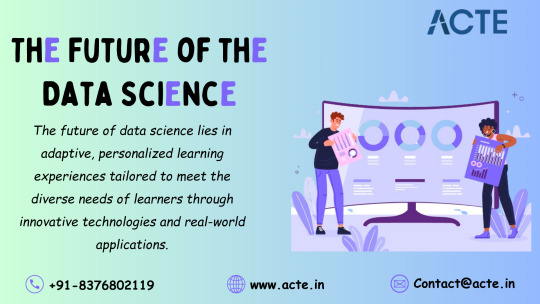
Advancements in Artificial Intelligence and Machine Learning:
Artificial intelligence (AI) and machine learning (ML) will continue to play a central role in the future of data science, powering advanced analytics, predictive modeling, and decision-making processes. Breakthroughs in deep learning algorithms, natural language processing (NLP), and reinforcement learning will enable AI systems to tackle increasingly complex tasks.
Democratization of Data Science:
The democratization of data science will gather momentum, as tools, platforms, and educational resources become more accessible to individuals and organizations. Low-code/no-code platforms, automated machine learning (AutoML), and pre-built models will empower non-technical users to analyze data, derive insights, and build predictive models without specialized expertise.
Ethics and Responsible Data Use:
Organizations will need to prioritize ethical practices, accountability, and regulatory compliance in their data science initiatives, building trust with stakeholders and fostering responsible innovation.
Convergence of Data Science and Other Disciplines:
Data science will intersect with other fields such as healthcare, finance, and sustainability, driving interdisciplinary collaboration and innovation. Cross-functional teams comprising data scientists, domain experts, and business stakeholders will work together to address complex challenges and unlock new opportunities for growth and social impact.
Challenges and Opportunities:
Despite its potential, data science faces challenges related to data quality, scalability, and interpretability. Organizations will need to invest in data governance, infrastructure, and talent development to overcome these hurdles. Data Science Online Training will thrive in interdisciplinary environments where collaboration between data scientists, domain experts, and business stakeholders.
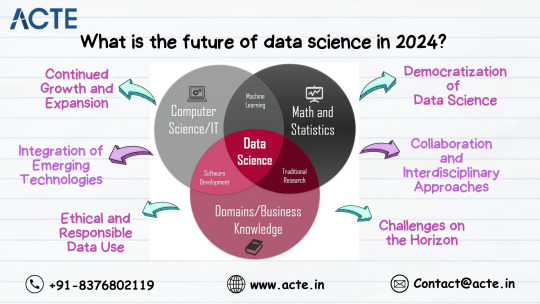
The Role of Data Scientists:
Data scientists will play a crucial role in driving innovation, guiding strategic decision-making, and building data-driven cultures within organizations. As the demand for skilled data scientists continues to rise, individuals with expertise in AI, ML, and data engineering will be in high demand across industries.
In conclusion, the future of data science in 2024 is filled with exciting possibilities and challenges. As organizations embrace AI, ML, and data-driven decision-making, data scientists will play a central role in shaping the future of work, driving innovation, and creating positive social impact.
1 note
·
View note